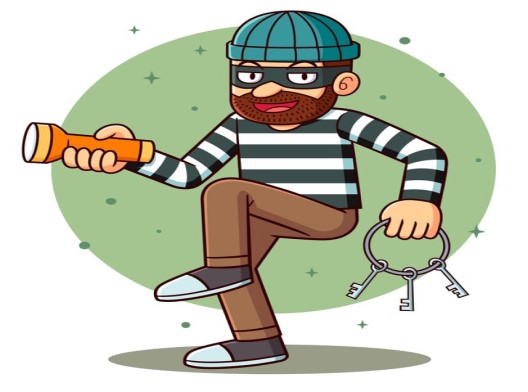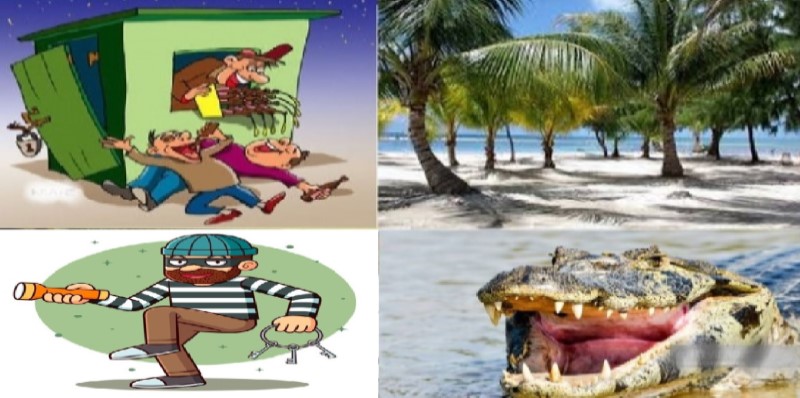You often hear tourists complaining about the high crime rate in their holiday destinations. Tourists do not realize that they are the ones who create the situation. Tourists are lured by travel agencies and colorful brochures. Dozens of estate agents praise the exotic and lure potential property buyers with promises of big discounts.
Hundreds of tourists and potential home buyers rush to buy tickets to fly there. Their wallets are full of dollars, and soon the streets and restaurants of exotic locales are buzzing with activity. This noise attracts those who also love the exotic and like to look at the property, but their interest is different.
Pickpockets, burglars, and crooks of all kinds are in a hurry. They look for crowded and noisy places, they don’t need the beauty of a deserted island. Criminals do not read leaflets, but they have a professional nose for money, just like a stray cat has a nose for fish guts.
It is said that the poorer the country, the more criminals there are. I would like to add a correction here, that the consciousness of society is not determined by the presence of natural resources in a country. The stability and economic success of any society are directly related to the history, traditions, and culture of its people.
For example, Russia is the richest country in terms of natural resources, but in terms of the number of crimes of all kinds, Russians are the world leaders.
Look at Denmark and Finland. There’s no oil or gas in their bowels. No gold or diamonds. Without all this, they have built normal societies with social benefits for all categories of their citizens. The main factor of success was not the presence of oil, but the high culture, morals and traditions of the nation. And the life of Danes was safe because they were surrounded by civilised nations. Since there was almost no crime in the country, prisons were closed for lack of necessity. With the collapse of socialism, parasites and criminals of all stripes from the Soviet Union and then Asians and Africans poured into Western Europe. And with the influx of these so-called ‘refugees’, imported criminals poured into Europe. The social stability of all European communities was shattered. And many, including the Danes, were forced to reopen their prisons.
In the major cities of all countries, crime has the same face: muggers and burglars. They steal cars, snatch houses and flats, rape and murder women. All this is in abundance in port cities, where there are many places with dubious reputations. I’ve lived most of my life in port cities in four countries, so I know the situation firsthand. Of course, the smaller the city, the less crime. And on the narrow peninsula where I live now, crime is generally low. Everyone knows each other here, and a travelling thief has no chance to escape because the police can block the road to the mainland in several places. Even if they try to escape by sea, they don’t stand a chance against the fast boats of the coastguard….

In our fishing village, thieves can steal small things. If a careless tourist leaves the door of his room unlocked, the thief can get in and steal something. The thief is not afraid of prosecution, he knows that the tourist will leave tomorrow and the police will close the case so as not to spoil the statistics.
At night, when the village is asleep, the thieves are awake. This is the time to visit a sleeping guest and see how deep his sleep is. He may have been drinking late at the restaurant and is now delirious with alcoholic dreams.
Bicycles, as the main means of transport, are stolen more often here. The newer the bike, the more likely it is to have a new owner. Bicycles are stolen by visiting tourists. They come from the mainland to enjoy the local beaches and tavernas. They have small but roomy trucks, and at night they prowl the streets looking for something to steal. And if the bike isn’t on a chain, it’s sure to be stolen.
Once, on my first holiday here, I rented a bicycle. At night I rolled it into the corridor of the hotel, whose front door was always locked at night. Later the neighbors had returned from the restaurant and forgot to lock the door from the inside.
In the morning I could not find my beach towel. I had left it on the bike to dry after swimming in the sea in the evening. The hostess was also upset; this ‘night visitor’ had stolen soft cushions from her balcony chairs. What kind of thief would steal a towel and cushions? Surely it was a local tramp who felt uncomfortable sleeping under a palm tree without a pillow. Once I was on the beach and found a bicycle in good condition in the water, but without the front wheel. The thief had just taken what he needed and thrown the bike into the sea. The evidence sank in the water!
A man from Canada has bought a house on the beach. Like me, he makes homemade wine and we have something in common to talk about. He has hired a local woman housekeeper who was often coming to do the homework with her children and friends. Recently his house was robbed. In the absence of the owner, a thief climbed in through an open window and stole two computers.
That was the price the Canadian paid for being careless. I’m sure one of the women present was the thief’s girlfriend or sister. And she was the one who left the window open when she cleaned the room. After that, my Canadian friend fired the servants and trusted no one.
WHAT DO I THINK ABOUT IT?
Private property spoils people. Once in my life, I knew a kind man. He worked and saved, and after work, he walked down the street smiling at everyone. Eventually, he saved enough or got money from relatives. And he bought a house. Soon he fenced his property in and his life became behind barbed wire. He put a sign on the gate: “An angry dog lives here!” He no longer smiles at anyone and sees everyone as envious and cunning, who wants to take away his property. And it is unclear to whom the inscription on his gate refers, to his dog or him…

Howdy! I would simply like to give you a huge thumbs up for the excellent information you have in this post.